Former Kyrgyz President: Central Asian countries could learn a lot from China
The friendship of thousands of years between China and Central Asian countries has witnessed the long-lasting prosperities along the ancient Silk Road. From the announcement of building “Silk Road Economic Belt” in 2013 to the “One Belt One Road” Summit in 2017, nations from Central Asia have been playing a crucial role.
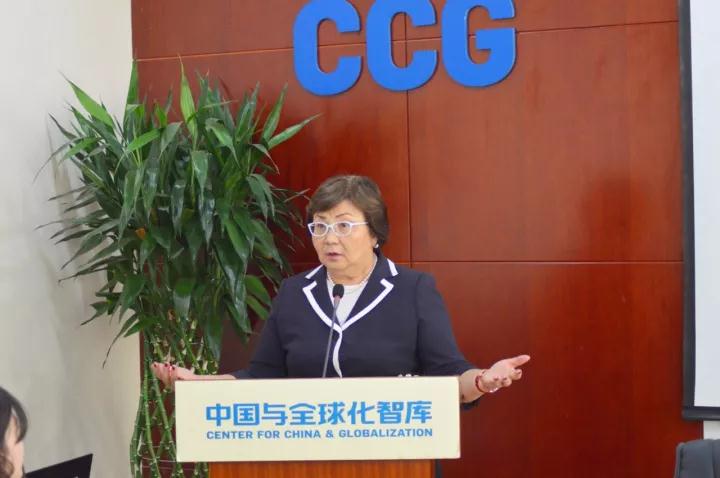
On December 1, 2017, Lady Roza Otunbayeva, the former president of the Kyrgyz Republic, was invited to deliver a speech at Center for China and Globalization (CCG), one of largest independent think tank in China with a topic — “China, Central Asia and the Greater Eurasia under the B&R Initiative”.
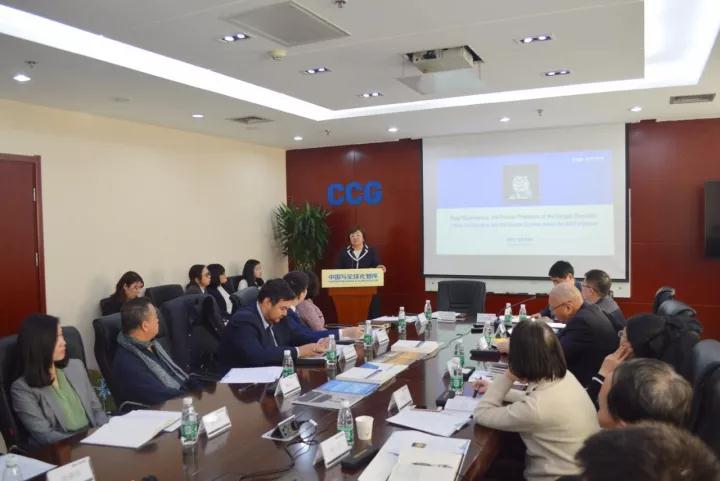
Introduction of the Central Asia
In the first part of her speech, Roza Otunbayeva introduced her country from several dimensions including physical geography, economic status, development of political parties and international engagement. What she had emphasized most was the geographical proximity between China and Central Asian countries like the Kyrgyz Republic. Besides, given the large population, vast territories and abundant natural resources, Otunbayeva underlined the contribution of Central Asia to the world economy and the economic interdependence between this region and rest of the globe.
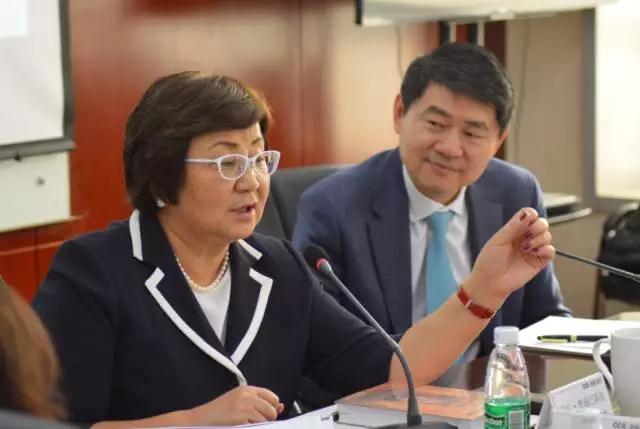
As one of the early participants of the Shanghai Cooperation Organization (SCO), Lady Otunbayeva shared valuable experiences about how SCO members gathered together dealing with international affairs. What’s more, the cooperation between Central Asian countries under the framework of Organization for Security and Co-operation in Europe (OSCE) had brought these Former Soviet Union countries closer, from Otunbayeva’s viewpoints.
Chinese economic success and international responsibilities
Lady Otunbayeva also mentioned about Chinese President Xi’s meeting with world politicians and his speech on the 2017 Imperial Springs International Forum. She was deeply impressed by Chinese economic performance and poverty alleviation efforts. As the public service reform in Central Asia has caused pains and hardships, in addition to the pervading social and political inequalities, Otunbayeva believed her country as well as its regional neighbors could learn a lot from China’s success on these topics. In her mind, the report of the 19th CPC national congress, which she read in Russian, was far-reaching and worth further studying.
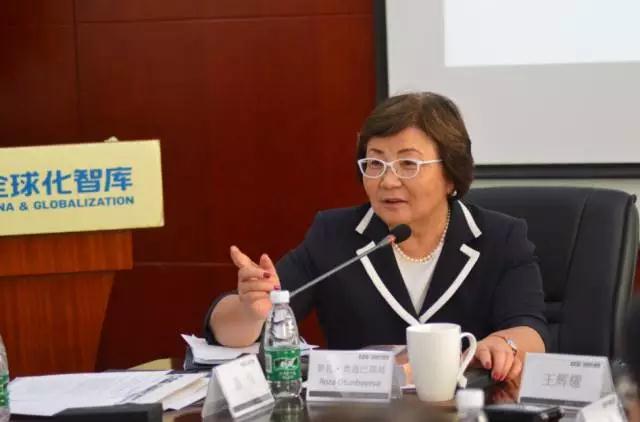
When it comes to the global governance, Lady Otunbayeva pointed out that China had shoulder more responsibilities on international affairs, with a considerable contribution to the world economy as the second largest economy globally. At the same time, Chinese oversea investment and construction based on the “One Belt One Road”, AIIB or other initiatives have drawn great attention in the Central Asia with the obvious improvement of local economies. Thus, Otunbayeva wished for more economic cooperation between China and Central Asia, especially on infrastructure construction.
People-to-people exchange
In the end, Lady Otunbayeva focused on the people-to-people exchange and cultural communication between her country and China. There are more than 3000 students from Kyrgyz republic in China nowadays, and 4 Confucius Institutes are located in the Central Asian country. While, in the former president’s opinion, the mutual understanding between two countries was far from enough, she was eager to see her country building a broader and more comprehensive partnership with China in the future.
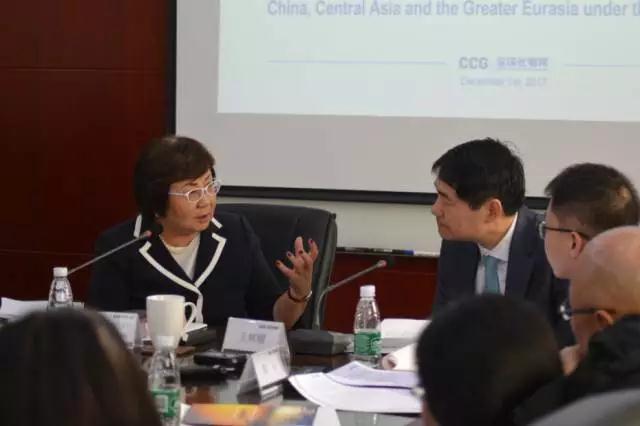
“One Belt One Road” is a peaceful initiative
After the speech, CCG president Wang Huiyao joined the discussion with Lady Otunbayeva. During the dialogue, they discussed about Central Asia’s role in the “One Belt One Road” initiative, the idea of “common destiny” and its importance in global governance and also the risks and solutions of the emergent immigration crisis in recent years. It is worth mentioning that Mr. Wang and Mrs. Otunbayeva had reached a consensus that “One Belt One Road” is a peaceful initiative and could be a peace keeper in the modern world.
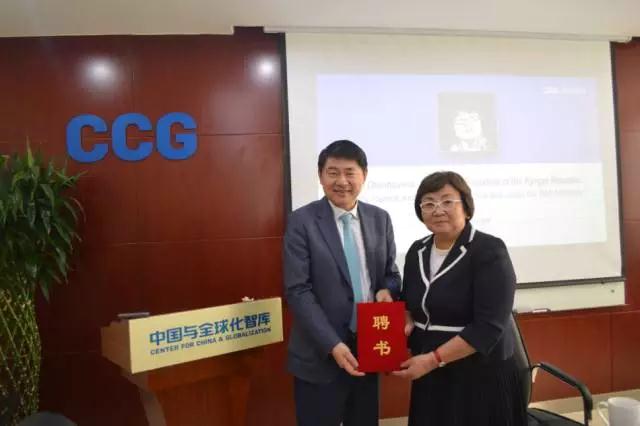
President Wang Huiyao and Lady RozaOtunbayeva exchanged gifts in the last part of the event. After that, Roza Otunbayeva was invited to be an international advisor of CCG.
Roza Otunbayeva’s Profile
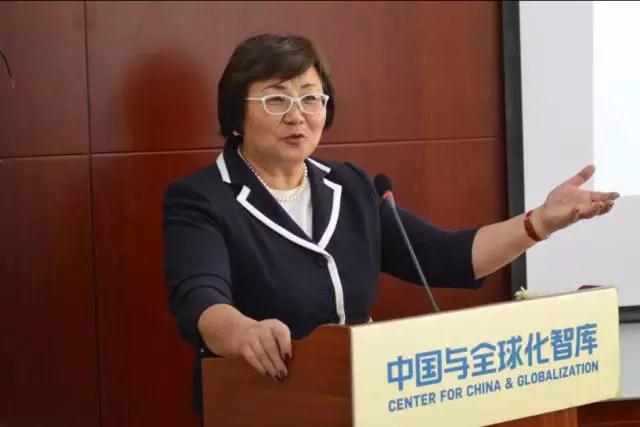
Hon. Roza Otunbayeva, Former President of the Kyrgyz Republic.
In 1981 Ms Otunbayeva began her political career as the Communist Party’s second secretary of the Lenin raion council (raikom) of Frunze. In the late1980s, from 1986 to 1989 she was Deputy Chairman of the Council of Ministers of the Kyrgyz Soviet Socialistic Republic, under the umbrella of the Minister of Foreign Affairs, and she served as head of the USSR Delegation to UNESCO in Paris, and later as the Soviet Ambassador to Malaysia. By 1992, the now independent Kyrgyzstan was led by Askar Akayev, who chose her to be both Foreign Minister (1994-1997) and Deputy Prime Minister; positions she held until later that year when she became her country’s first ambassador to the USA and Canada.
In 1997-2002, she served as the first Kyrgyz ambassador to the United Kingdom. In 2002-2004, she was the deputy head of the United Nations Observing Mission in Georgia. Upon her return to Kyrgyzstan in late 2004, she and three other opposition parliamentarians founded the Ata-Jurt (Fatherland) party in preparation for the February 2005 parliamentary elections.
She was barred from becoming a candidate for the 2005 legislative election due to a previously enacted law requiring prospective MPs to have resided in the country for 5 years prior to the elections. Her time as ambassador to the United Kingdom prevented her from meeting this criterion. During this year she was acting Minister of Foreign Affairs.
Otunbayeva was one of the key leaders of the Tulip Revolution in Kyrgyzstan which led to the overthrow of President Akayev. She also played a key role in November 2006 protests that pressed successfully for a new democratic constitution. In December 2007, Otunbayeva was elected to the parliament of Kyrgyzstan on the candidate list of the Social Democratic Party of Kyrgyzstan.
On April 7, 2010, Roza Otunbayeva was selected by opposition leaders as head of a Kyrgyz interim government, following widespread rioting in Bishkek and the ousting of President Kurmanbek Bakiyev who left the country on April 15.
Following a referendum of the new Kyrgyz Constitution, she was officially sworn in as President of the Republic on July 3, 2010, serving until December 2011.
In January 2011, she founded the Roza Otunbayeva Initiative International Foundation.
She has received France’s “Legion of Honour” Award with the degree of Commander, as well as the highest order of Mongolia “Polar Star” Award.
In 2011, she received an International Women of Courage Award, which is presented annually by the United States Department of State to women around the world who have shown leadership, courage, resourcefulness, and the willingness to sacrifice for others, especially while promoting women’s rights.
She is a member of: Club de Madrid (Madrid), Board of Trustees of the International Crisis Group (Brussels), Governing Board of the Interstate Foundation of Humanitarian Cooperation of the Commonwealth of Independent States (CIS) (Moscow), Leadership Council of the Sustainable Development Solutions Network, a Global Initiative of the United Nations (New York), Board of the UN University for Peace (UPEACE) in Costa Rica, Board of the UNESCO Mahatma Gandhi Institute of Education for Peace and Sustainable Development (New Delhi), UN IOM Migration Advisory Board (Geneva).
She is an Honorary Professor at the Shanghai University of Political Science and Law (China), Honorary Professor at the Ganjavi University (Azerbaijan) and Honorary Professor at dozen of Kyrgyz Universities.
LocationBeijing





